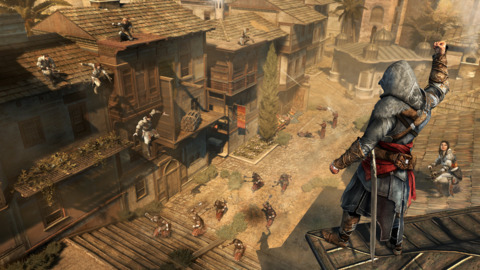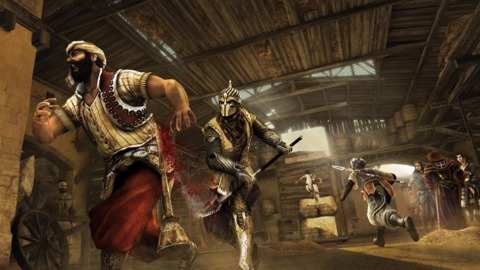
Last year’s release of Assassin’s Creed: Brotherhood came saddled with concerns that Ubisoft was too quick to capitalize on the success of Assassin’s Creed II, a terrific adventure that went to great lengths to address the issues of elegance and repetition of the still-ambitious original. Brotherhood allayed these concerns with meaningful additions to both the gameplay and the story, and a general sense of cohesion that you might not expect from a game of such scope turned around in just one year’s time. Now we have Assassin’s Creed: Revelations, the third game in the series in as many years. The production values are as strong as ever, and it retains most of the tricks that kept Brotherhood from feeling like an also-ran, like the ability to build your own assassin’s guild and a surprisingly engaging suite of multiplayer modes. The additions Revelations makes on top of those features, though, don’t feel quite as essential to the experience, sometimes adding complication just for the sake of it. Assassin’s Creed: Revelations, the name alone, suggests a certain amount of closure, but the greater Assassin’s Creed story feels like it’s starting to spin its wheels.
Let me just say right now, if you’re not current with the Assassin’s Creed series, or if this would be your first Assassin’s Creed game, you should probably stop reading here and get yourself caught up. Though it tries gamely with a quick-cut “previously on...” montage to get folks up to speed, the story of Revelations is so intrinsically tied to the previous games that it makes for a series introduction that’s confusing at best. Desmond Miles, the seemingly mild-mannered bartender whose genetic memory has been the stage for the Assassin’s Creed series up to now, is in a bad way after the events of Brotherhood. Left catatonic, with his mind fragmented between his own experiences, and those of his ancestors Altair and Ezio Auditore, Miles has been jacked back into the Animus as a sort of mental life support. Inside the Animus loading program he meets Subject 16, or at least what’s left of him, who lays out the plot pretty simply: Desmond needs to see Ezio and Altaïr's stories to their conclusion if he ever hopes to wake up.

Even though the entirety of Revelations takes place inside Desmond’s mind, he’s barely a guest star here, with the focus primarily on Ezio, and, to a lesser extent, Altaïr. There is a peculiar set of optional side levels--abstract, awkward, first-person puzzles--you can load up from inside the Animus that offer some insight into Desmond’s back story, albeit in a shockingly dry, casual manner. Most of the time, though, you’re playing as Ezio, now a bearded, weathered old man, whose dogged campaign against the Templars has led him to Constantinople, where he hopes to find a set of five keys necessary to open Altaïr’s library back in Masyaf before the Templars do. There are major subplots in Constantinople concerning political maneuvering within the local Sultan’s family, as well as Ezio’s growing affection for a local book dealer who is assisting him in his search, but other than the typical, largely anonymous Templar forces working against him, there’s not much of a central conflict here--just a task that needs doing.
The keys to Altaïr’s library, it just so happens, are made from the same material as the Apple of Eden, and with each key Ezio finds, he’s given a brief glimpse into Altaïr’s life. (This means that Desmond’s experiences as Altaïr here are twice removed, though the game never gets all Inception with exploring the layering of reality.) Unlike Ezio, who has the full run of Constantinople, the episodes where you play as Altaïr are highly constrained, taking place almost exclusively in and around the guild castle at Masyaf from the first Assassin’s Creed. These sequences aren’t much to play, and though they provide some insight into snippets of Altaïr’s life after the events of Assassin’s Creed, their implications for the fiction at large seem limited. Yes, we know more about Altaïr’s family and his turbulent relationship with his guild, but it all goes by so quickly that it’s hard to get terribly invested. Generally speaking, Revelations is more interested in filling in back story than it is in maintaining forward momentum. There is an ironic paucity of revelations in Revelations.
It’s much easier to like Revelations if you’re not here for the story, as the fundamental action of dynamic urban traversal and timing-based combat that’s both lightning-quick and thick with arterial spray still feels terrific. With a few, minor exceptions--like the ubiquity of horses--Revelations brings back nearly all of the bells and whistles that helped make Brotherhood so good, such as the ability to cultivate your own assassin’s guild, send assassins out on international assignments, buy up local business for added income, take over Templar strongholds, and take on missions for the local mercenaries and thieves guilds.
On top of all this, Revelations piles on a few of its own systems. Ezio has had one of his standard hidden blades replaced with a locally sourced hookblade, which mostly just makes climbing up sheer buildings a bit faster and allows you to make use of Constantinople’s plentiful, conspicuous ziplines, though it also serves some minor combat and evasion purposes. The combat generally still moves at the same bracing speed as it did in Brotherhood, though you’ll eventually encounter enemies that require slightly more strategy and patience to take down--assuming you don’t just call in your guildmates to finish them off for you. Ezio also gets introduced to the craft of bomb-making, which allows you to combine different types of reagents you find, buy, or steal for different explosive results, which I regularly found quite handy.
Revelations makes a certain effort to unify some of its disparate systems, though by creating interdependencies between the assassin’s dens you establish in Constantinople, Ezio’s current “heat” level with the Templars, and the experience levels of the assassins you’ve been training, it’s more difficult for you to dabble in one while ignoring the others. Basically, if you don’t protect your dens, the Templars can try and steal them back. In order to retain control, you have to play through what is essentially a brief tower defense scenario, placing different types of assassins on rooftops and barriers in the streets to fend off waves of Templar attackers. Or, if you find the tower defense stuff as tedious as I did, you just let the Templars take over, then just sweep back in, murder the Templar captain, and take control again.

If there's one area that Revelations makes some unequivocal improvements over Brotherhood is in the multiplayer, which features more maps, more modes, more playable characters, and more customization options as you level up. Subtle tweaks make it easier to defend against an attacker, and the choice in certain modes to remove the directional radar in favor of a simpler, less explicit proximity meter means you have to pay closer attention to make sure the person you're following is your intended target. If there's a critique, it's that some of the modes can seem a little complicated at first blush, though a training room allows you to familiarize yourself without drawing the ire of Internet Teens.
For the most part, what was great about Assassin’s Creed: Brotherhood is still good in Assassin’s Creed: Revelations, but the new stuff doesn’t do much to improve the experience, and all the best moments just feel kind of familiar. Even though the game takes place in an entirely new city, the old-world aesthetic isn’t that radically different. This is probably overstating the shortcomings of Revelations, but when I finished the game I was left concerned about the future of the Assassin’s Creed franchise. Ubisoft seems completely intent on making Assassin’s Creed an annual franchise, and at this rate, I’m afraid it will have exhausted its goodwill before we get to see a proper Assassin’s Creed III.